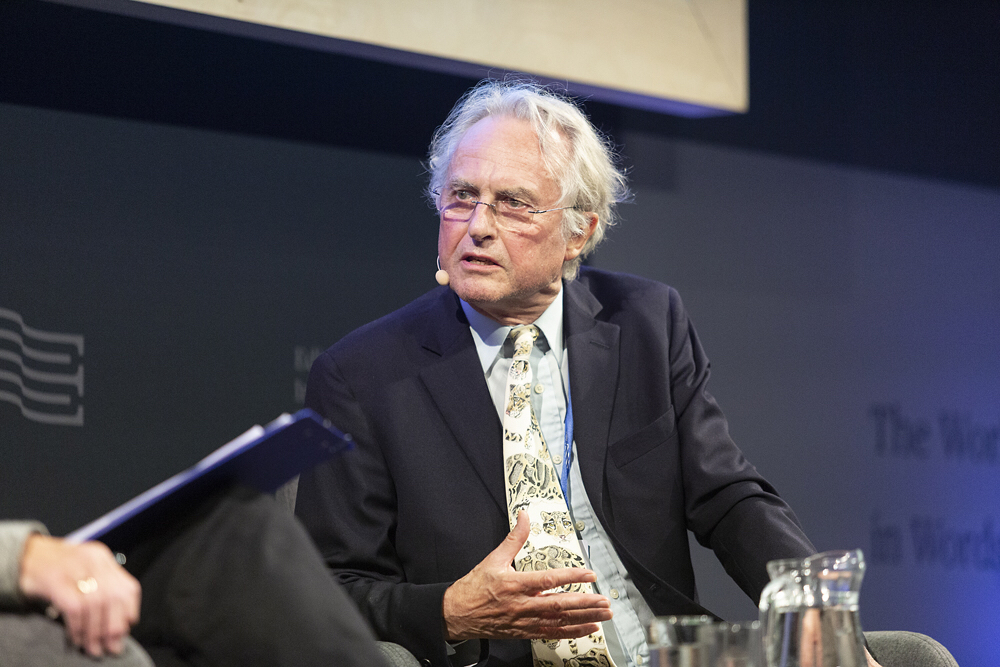
BY BOB CUMMINS
Ruth Wishart, the journalist and broadcaster, introduces scientist and author Richard Dawkins at this afternoon’s sold out show as a professional atheist and serial controversialist. In the next hour, he will discuss everything from brexit to two hundred million year old fish.
Dawkins, probably known best for his contentious book, The God Delusion and his blunt and forthright views on religion is in Edinburgh to promote his new book, Science In The Soul.
One might think that with a title such as this, Dawkins may be flirting with religious, philosophical and mythical beliefs. But this book is a call for reason over gut feelings, the importance of empirical evidence over blind prejudice. There are 42 essays that decry bad science, religious fanatics and climate change deniers.
Wishart can’t resist asking the scientist about his past denunciation of religion. Although not the entire theme of Dawkins’ new book, one of the essays talks about religion being on of the greatest threat to humankind, “rather like smallpox, but more difficult to eradicate.” Wishart quotes from Dawkins’ book.
“Obviously not all religion” Dawkins qualifies. “But religious faith, if it is taken seriously, unassailable faith, because it depends on unargued faith, is vulnerable to being bad because you can not argue against it; a minority of individuals will take their faith so seriously, that they will do terrible things.”
“You don’t think, presumably that all religions are a force for bad and that no religions are a force for good.” Wishart asks. “No, I never said that” Dawkins clarifies.
“But, there is an actual, rational pathway that leads from the premise of unargued faith, by logical steps to terrible violence” furthers Dawkins.
There are further qualifications from Dawkins clarifying his view on the link between religion and the fringe fanaticals responsible for some of the atrocities that we have seen of late and across time. Dawkins is surprisingly, in favour of religious education but, he clarifies that he is referring to the teaching of the history of religion, not the indoctrination of children into religion.
The conversation turns to more recent events around the Monsanto cancer case in America and the emails allegedly requesting Scientists to reflect the view of the corporation. “In other words, they were asking the scientists to cheat” Wishart states.
Reference is made to tobacco and climate change as similar examples where scientists were paid to produce an argument in favour of a multimillion industry or political point of view.
“This is utterly deplorable” agrees Dawkins. “Science depends upon the presumption that scientists are honest. This does not apply to some other professions, the legal profession, for example”. He accusingly adds.
Dawkins also offers his opinion on Sir Ronald Fisher, “probably the most distinguished statistician and evolutionary biologist of the first half of the 20th century, was bought by the tobacco industry.” He states. “The ones who were bought by Monsanto were not great scientists but it is equally deplorable.”
You can hear the anger and sadness in Dawkins voice as he recounts these despairing truths about the scientific world.
A change of direction is required before doom and gloom sets in. Wishart reaches for the book and reads. ”If a time machine could serve up to you, your two hundred million great grandfather, you would eat it with lemon and sauce tartar as he was a fish.”
This is from the essay in the book called The Tyranny of The Discontinuous Mind. “We draw lines between things where lines ought not to be drawn” Dawkins explains. “People often ask the question, who was the first human being? The answer to that is counter intuitive.”
He continues to explain that every creature ever born was born to the same species as it’s parent. But, paradoxically, after two hundred million years of very slight mutations, there is a link between humans and a fish of long-ago.
“There never was a pair of australopithecine ape parents who looked into the cradle at the first human baby, it didn’t happen like that.”
In a completely different direction, but also related, the conversation turns to emotion and the voting booth. Wishart refers to the book once again. “You say that there is no place for gut instinct in the voting booth”.
“It is best to decide rationally and on the side of evidence, what is the best policy, rather than be persuaded by gut feeling.” Dawkins replies. He is talking mainly about Brexit. He believes that David Cameron should never have offered a referendum on such an important and complex topic. One that you need facts but do not have the time or opportunity to obtain them.
Doom and gloom again, but, on a brighter note, Dawkins does believe that we (humans) are going in the right direction, on the whole and although there are zig zags, and sometimes we go backwards, things are better than they have been in the past. His basis for this statement are two works, Steven Pinkers, ‘The Better Angels of Our Nature’ and Michael Shermer, ‘The Moral Arc’.
One final thought from Dawkins; a quote in his book “If scientific views could vote, evolution would surely vote republican” This is his explanation on that quote: “If you take Darwinian natural selection as a political lesson, and you should not do that ever, but if you were to do that, the kind of world and the political system that you would end up with would be a deeply unpleasant one, and one that would appeal to extreme republicans.”
He further adds – “We must stop taking advice from nature. Nature is red in tooth and claw. I write books about scientific truth, people are free to read them or not.”
This session was an interesting, thought provoking hour, with far to many nuggets of advice and wisdom to write about.
Science in the Soul is published by Black Swan 2018 and is sure to a provocative and compelling read.

